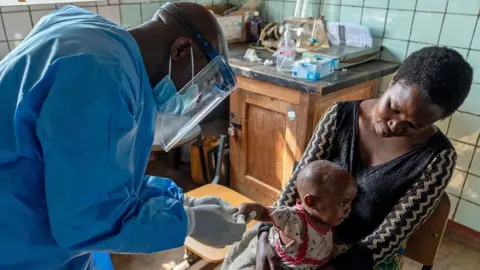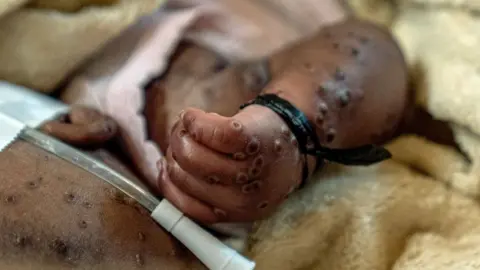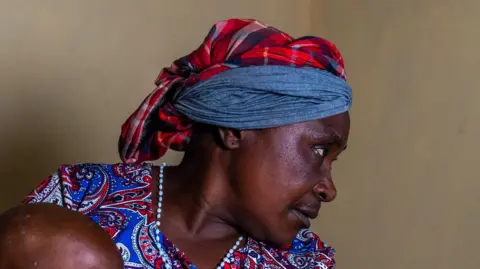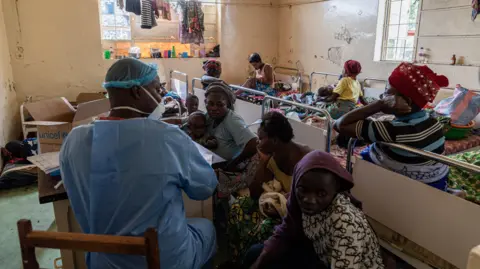

Medical staff on the frontline of the battle against MPOX in eastern DRC told the BBC they are eager for the vaccine to arrive to help stem the rate of new infections.
A BBC visit to a treatment centre in South Kivu province, the epicentre of the outbreak, said more patients, particularly babies, were arriving every day and essential equipment was in short supply.
Mpox, formerly known as monkeypox, is a highly contagious disease that has killed at least 635 people in the Democratic Republic of Congo this year.
Some 200,000 doses of vaccine donated by the European Commission were airlifted to the capital, Kinshasa, last week but have yet to be transported across the vast country and could take weeks to reach South Kivu.
“We found out from social media that the vaccine was already available,” Emmanuel Fikiri, a nurse who works at a clinic that has been turned into a specialist centre for combating the virus, told the BBC.
He said this was his first time treating a patient with MPOX and he feared every day that he would infect his own children, ages 7, 5 and 1.
“You have seen how I have interacted with patients because that is my job as a nurse. So I am asking the government to give me the vaccine first.”
Transporting the vaccine takes time because it needs to be stored at precise below-freezing temperatures to maintain its effectiveness, and because it needs to be sent to rural areas of South Kivu province, including Kamitsuga, Kavumu and Luwiro, where the infection is widespread.
A lack of infrastructure and poor road conditions mean helicopters may be used to drop some of the vaccines, further raising costs in an already cash-strapped country.
At his local clinic, Dr. Pacific Carranzo had been busy all morning and appeared tired and depressed.
He was wearing a face shield but you could see the sweat running down his face. It was sad to see the patients sharing their beds, he said.
“You can see patients sleeping on the floor,” he told me with obvious annoyance.
“The only help we have received so far is a little bit of medicine and water for patients. As for other challenges, there is still no motivation for staff.”


Another problem, he said, was that there wasn’t enough personal protective equipment. [PPE] For healthcare professionals.
“We’re doing everything we can to take care of the sick and not put ourselves at risk. We’re not immune to the disease either.”
Entering Luwiro Regional Hospital, about an hour’s drive north of Bukavu, South Kivu’s main city, you are greeted with two major shocks.
First, the loud cries of a baby echoing around the room, then the foul stench of urine and stagnant water.
Clean water is scarce in the clinic and people have to conserve water from small jerry cans kept under their beds.
The clinic, which typically treats about 80 patients a month, has been overwhelmed with nearly 200 over the past three weeks, and the patients are becoming younger.
“It’s sad to see my eldest son suffering from this strange disease. It really breaks my heart,” said 18-year-old Farajah Lukara.
Her son, Murfla, is currently the clinic’s youngest patient with multiple sclerosis at just four weeks old. Like many of the other patients here, this is her first time suffering from multiple sclerosis, which is caused by a virus in the same family as smallpox.
The disease causes loss of appetite and many children become malnourished.
In the next room several women and children (about 20 people) were crammed into seven beds with only two mattresses on the floor.
Ten-month-old Amenipa Kabuya, the first patient to contract MPOX at the hospital, recovered, but shortly after being discharged, her mother, Yvette Kabuya, also contracted MPOX and returned to the hospital.
Seeing the effects of the disease on the body — painful, pus-filled lesions, fever and weight loss — has made people eager to get vaccinated, which is unusual in a region that has historically been hesitant to vaccinate.
“I just saw my child get sick, I didn’t even know the name of the disease,” said Beatrice Cachera, 50, as she gently stroked the cheek of her 3-year-old granddaughter, who had rushed over in a panic.
“We can’t wait for children and adults to die, let’s get the vaccine,” she told the BBC.


But some fear that a solution will not be easy due to ongoing armed conflict in eastern DRC between the army and several armed groups, particularly the M23 rebels.
“The conflict is having a serious impact on the vaccination programme in general,” Dr Gaston Brumbo, North Kivu provincial health director, told the BBC.
“Not only measles vaccination but all vaccination programmes have been affected as it is difficult to get vaccines to health zones. This is due to insecurity.”
The governor of South Kivu, himself a Luwiro native, told the BBC that heavy fighting had forced many people to flee their homes and seek refuge in his province, worsening the spread of the disease.
“We are hosting thousands of internally displaced people. [internally displaced people]and still suffers from many problems,” said Jean-Jacques Poursi Sadiki.
“Most of the funds are being put towards fighting the ongoing war, buying military equipment and feeding the troops,” he said.
“The country is losing a lot of money fighting this war. [this money] Enter into social development, including the health sector.”


The governor, however, believed that the rebels would not disrupt the delivery of the vaccines as MPOX also has influence over people in rebel-controlled areas.
He said the government was doing its best to get the supplies needed by health workers: “I will be heading to Luwiro myself in the next two days to ensure that we provide what we can as emergency assistance to the population until the government in Kinshasa can provide more assistance.”
Officials have said vaccinations will begin in October, with priority being given to children under 17 and those who have been in close contact with infected people.
Governor Prusi Sadiki is confident the spread of the virus in the province can be contained: “It’s a matter of political will. I am confident we will succeed.”
It’s a sentiment not yet shared by exhausted doctors like Dr Calanzo at Luwiro Hospital, but they are encouraged that at least awareness of MPOX appears to be growing in their area.
People appear to be coming to clinics as soon as they experience symptoms, rather than going to traditional healers first, meaning the hospital has not yet experienced any deaths from MPOX.
But with 5,049 confirmed cases in the Democratic Republic of Congo so far this year, clinic staff say speed is crucial: Only a combination of vaccines, medicines and other supplies to improve hygiene can curb the spread of the disease.
More BBC articles about mpox:




